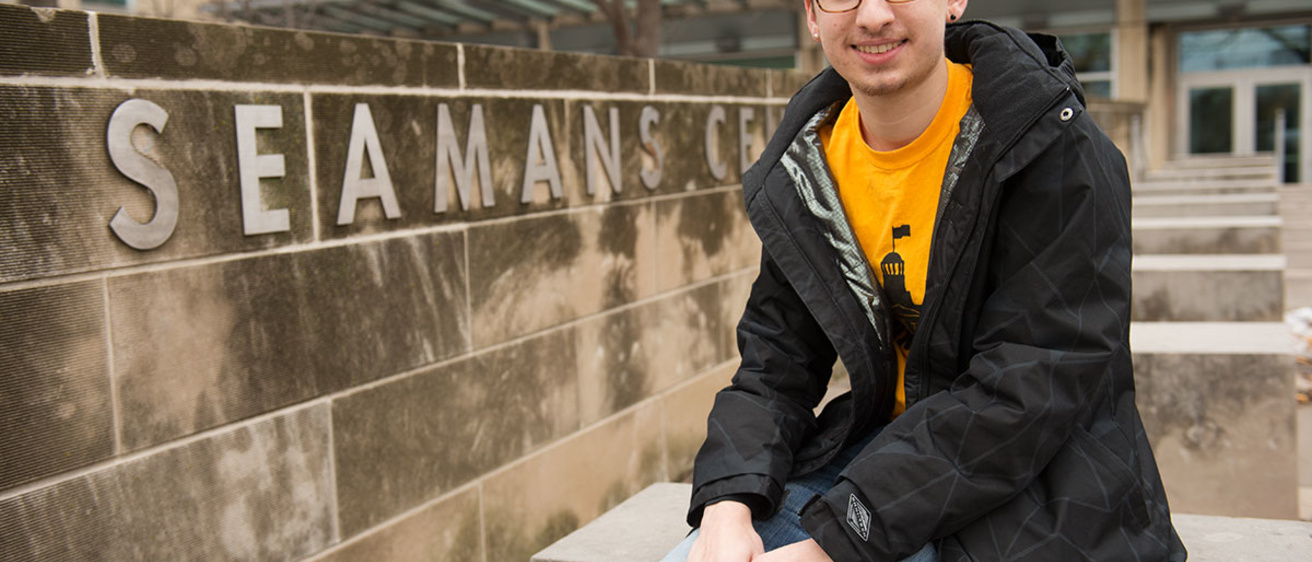Harrison Freund just wanted to be around other people who would understand the challenges he faces being an openly bisexual student majoring in a STEM field.
When he arrived at the University of Iowa last fall, the first-year West Des Moines native had a hard time identifying other LGBTQ students in engineering.
So he sent an email to Tonya Peeples, associate dean for diversity and outreach in the College of Engineering, asking how he could help build community among lesbian, gay, bisexual, transgender, and queer students with interests in science, technology, engineering, and math.
Now the UI sophomore computer engineering student is preparing to apply for an oSTEM (Out in Science, Technology, Engineering, and Mathematics) group to receive official student organization status. He also intends to seek accreditation from the national oSTEM chapter, which would make his the second oSTEM-recognized organization in Iowa. Grinnell College has an official chapter.
“There’s a stellar LGBT community here and lots of resources, but there’s a different feel when you’re talking about people who want to become scientists and engineers and mathematicians,” Freund says.
oSTEM is a national society dedicated to educating and fostering leadership for LGBTQA communities in the STEM fields, according to its website, and has more than 50 chapters across the country. Other Midwest chapters are located in Milwaukee, Wisconsin; Lawrence, Kansas; and Champaign, Illinois.
Freund, 20, came out at the end of his senior year in high school. He didn’t always want to be an engineer but says his fascination with computers after taking an animation class influenced his field of study. His physician father and lawyer mother didn’t encourage him to do anything other than pursue a field that interested him.
The College of Engineering has been very welcoming, he says, but adds that he thinks there’s sometimes an implicit silence about sexual orientation.
“It’s not very comfortable talking about it, especially in that space. It’s what’s lacking,” he says.
For more information
Any LGBTQ student involved in a STEM field, any campus ally wanting to learn more about the group, or anyone who would like to join, should contact Josh Atcher at joshua-atcher@uiowa.edu or call 319-335-5763.
Harrison Freund can be reached at harrison-freund@uiowa.edu.
After hosting an initial information meeting to gauge interest in an LGBTQ STEM group, Josh Atcher, director of tutoring and an academic adviser for first-year students in the college, volunteered to be its adviser. He says he wants to help students to feel comfortable accepting their own identity.
“We’re in this new age where people can get married, and there’s a lot of talk about the transgender community in the news,” says Atcher, who identifies as gay. “People are talking about it more, and I think we need to follow suit in the College of Engineering and at the University of Iowa.”
Peeples says finding a comfortable environment among STEM disciplines can be difficult, and those who identify as LGBTQ often feel it’s risky to openly talk about their sexuality.
“The University of Iowa is really in a positive position to be a welcoming environment for LGBT students because it’s an articulated value of diversity that we have as an institution, and you don’t find that everywhere,” she says.
Freund hopes to receive official student group status during the spring 2016 semester and continue pursuing chapter status with oSTEM. He says he hasn’t given much thought to the positive impact the group might have on future UI students.
“I just want to quietly live my life, and I just want to quietly be geeky and be accepted for it,” he says, though admitting, after some reflection, that what he’s doing is significant.
“Even though sometimes you have to deal with negativity, you still spread a kernel of positivity to a lot of people, and so that’s what makes it worth it.”
